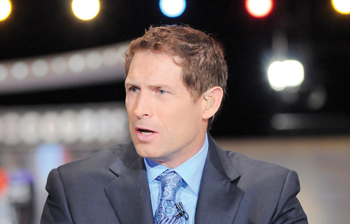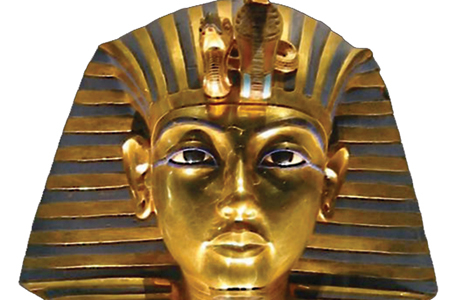In the city by the Bay – the one Tony Bennett left his heart in – Steve Young is regarded as the legend who succeeded another legend, Joe Montana, as quarterback of the San Francisco 49ers.
But in another town that overlooks another ocean, Young is remembered as the local boy who made good, the one who mowed the neighbors’ lawns and delivered the newspaper, the one who didn’t complain when the grandmothers pinched his cheeks, the one who never forgot his roots.
As he donned the yellow jacket for his 2005 induction into the Pro Football Hall of Fame in Canton, Ohio, he said his mind flooded with images. But they weren’t the images of a tumultuous, triumphant NFL career that was crowned by being named NFL MVP and Super Bowl MVP in the same season (1994). Rather they were the images of a kid who wanted to play quarterback for the North Mianus Cowboys, his Greenwich elementary school team, and a teen who starred in football, baseball and basketball at Greenwich High School.
“Why were those the images?” the ESPN analyst wondered aloud before a crowd of 350 at the Hyatt Regency Greenwich in October as he was enshrined in the Greenwich High School Sports Hall of Fame. “It’s your roots. It’s where you became who you are. If it takes a village to raise a child, you were that village for me.”
Young came to Greenwich by way of the West. A great-great-great grandson of Brigham Young – second president of The Church of Jesus Christ of Latter-day Saints, for whom his descendant’s alma mater, Brigham Young University, was named – Jon Steven Young was born Oct. 11, 1961 in the Mormon stronghold of Salt Lake City. But his father’s career, as a lawyer for the Anaconda Wire and Cable Co., would bring Young east.
The Mormon tradition is one of discipline and few are more disciplined than Young’s father, LeGrande. Not for nothing is his nickname “Grit.”
“Steve’s was no (wealthy) back-country upbringing,” said Pat Mediate, a phys ed instructor at Greenwich High who coached Young in the late 1970s.
LeGrande Young instilled in his five children the sense that if you wanted something in this world, you had to earn it. Steve, the eldest, mowed lawns and delivered the Greenwich Time. He worked at country clubs and ice cream parlors. He studied the Bible in Scarsdale.
That was in addition to academics and athletics. At Greenwich High, he took a heavy load of AP classes, was a National Merit Scholar, won the Harvard Book Award for English, captained the football, baseball and basketball teams and still had time to date a future Miss USA, Christy Fichtner.
Blessed with natural athleticism, a strong if as-yet-undisciplined left arm and terrific, deceptive speed, Young excelled at sports. In his senior year, he averaged 15 points a game as a point guard, batted .384 and was 5-1 as a hurler, including a 3-0 no-hitter against New Canaan High School. In two seasons as quarterback, he ran the ball 267 times for 1,928 yards, earning All-Fairfield County Interscholastic Athletic Conference West Division First Team honors both years and Connecticut Interscholastic Athletic Conference honors his senior year.
“As good as he was on the field, that’s as nice as he was off the field,” Mediate says.
Young was, then, a golden boy. But that’s not how he saw himself.
“I was nothing special,” he said. “I was a good athlete who played hard.”
In that he was spurred not only by his father, whose flintiness was balanced by the protectiveness of his mother, Sherry, a woman perfectly capable of running out onto the field during Young’s elementary school days and warning another kid about hitting her son.
“The coaches were tough guys,” he said, “and they prepared me for tougher situations. It wasn’t like they were critical. It was honest.”
Young would need all that toughness and honesty as he zigzagged his way to the top of the pile. At Brigham Young University, which he entered two credits shy of sophomore status, Young struggled with his passing game in the shadow of the record-setting Jim McMahon yet went on to set NCAA records, be named an All-American, win the Davey O’Brien National Quarterback Award for best collegiate signal-caller and score the game-winning touchdown as BYU took the 1983 Holiday Bowl from Missouri 21-17.
It was a pattern that would follow Young throughout his career – rocky start, brilliant finish. He signed a record 10-year, $40 million contract with the Los Angeles Express of the United States Football League only to see the USFL go bust in its second season. It’s a measure of Young’s character that he chipped in to pay the team bus driver, whose paycheck had bounced, to get the players to a game, then took snaps from the shotgun formation, because the Express had no healthy running backs.
From there, things could only improve. But Young’s time with the Tampa Bay Buccaneers was mediocre at best and he was traded on April 24, 1987 to the 49ers to back up Joe Montana, whom many experts consider to be the greatest quarterback to date. It was, Young recalled, “the ultimate challenge.”
Still, he shone as the 49ers took Super Bowl XXIII and XXIV. Then things got sticky. Montana hurt his elbow and Young became the starter for the 1991 season but struggled with an injury of his own. Despite a very good season, the 49ers finished out of the postseason money for the first time since 1982.
At the start of the 1992 season, it looked as if Young’s starting gig was in peril with Montana set to return. But he didn’t make an appearance until the season’s final game. By then Young had ratcheted up the kind of numbers that earned him his first MVP award and first trip to the Pro Bowl.
By then, too, the team was divided over who should lead them, as recounted in Adam Lazarus’ highly readable “Best of Rivals: Joe Montana, Steve Young and the Inside Story Behind the NFL’s Greatest Quarterback Controversy.”
Something had to give and it did when Montana was traded to the Kansas City Chiefs in the spring of 1993. From then on, the 49ers were Young’s to lead and he did so superbly, setting franchise records in 1993 and then navigating the 49ers through a dream season in 1994 that saw the team win Super Bowl XXIX. Young threw six touchdowns, breaking Montana’s Super Bowl record of five. He had also broken Montana’s single-season passer rating with a 112.8. The monkey was off his back.
But Montana’s presence wasn’t the only challenge Young faced in his NFL career. Known for his toughness and running ability, he was a natural target for opposing teams, suffering several concussions that went back to BYU. “League of Denial,” which aired on PBS’ “Frontline,” suggests that after suffering a concussion in 1999 in a particularly brutal blitz by Arizona Cardinal Aeneas Williams, Young walked off the field and never looked back. But the book that inspired the riveting documentary – in which ESPN investigative reporters Mark Fainaru-Wada and Steve Fainaru consider how the NFL sought to bury links between concussions and a form of early-onset dementia known as CTE or chronic traumatic encephalopathy – paints a more complex picture.
As an entire nation – from the 49ers and sportswriters to the elderly ladies who came up to touch his face – urged him to retire, Young faced perhaps his most wrenching decision, go on to play for the Denver Broncos and risk winding up punch-drunk or retire with his mind intact.
It’s a good thing he chose the latter, for Young has had a splendid second act. When Salt Lake City was awarded the 2002 Winter Olympics, he was among the first volunteers. He was part of the group that received the Olympic Flag after the 1998 Nagano Games, and he carried the placard for Great Britain in the opening ceremony of the 2002 Games.
Today, he’s not only a commentator on ESPN’s “Monday Night Football” and pitchman for Van Heusen dress shirts, but managing director of Huntsman Gay Global Capital, a private equity firm, which he runs, along with his Forever Young charity, in California. There he lives with his wife, the former model Barbara Graham, and their four children.
On the dais, he is a captivating storyteller without notes. You can imagine him as a trial lawyer and he does have a J.D. from the BYU J. Reuben Clark Law School.
That wasn’t a help, he said in his self-deprecating manner, when he signed a contract to go to Disneyland after the 49ers won Super Bowl XXIX. He never realized it would mean actually going to Disneyland.
As the parade ended, with him and Mickey Mouse atop a float, two little boys looked up at them.
“You can’t get near him,” one boy told the other about Mickey. “The big guy won’t let you.”
“There you have it,” Young said with the relish of a man who appreciates life’s twists and turns, “from Super Bowl MVP to Mickey Mouse’s bodyguard.”





